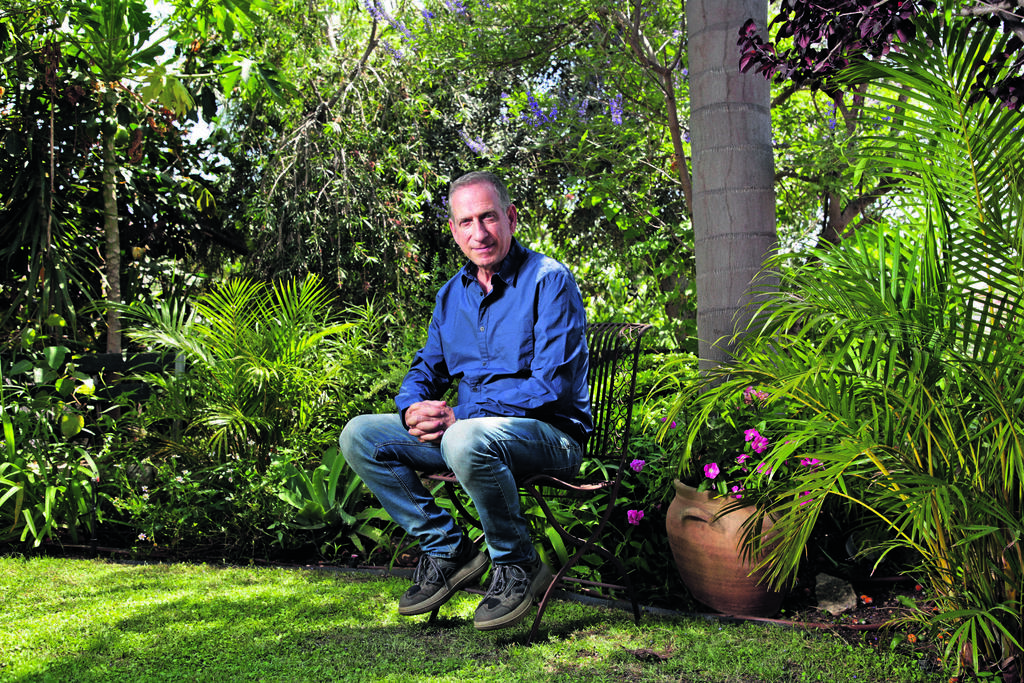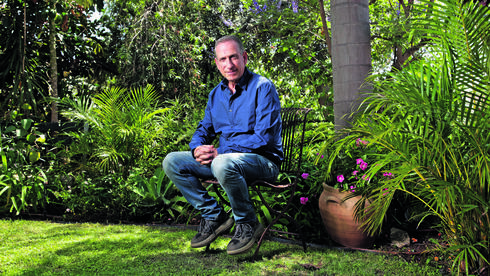Gal Almog was one of the pioneers of Israeli high-tech, a serial entrepreneur who founded RealMatch and Talenya and made an enormously profitable “exit” by selling them. In his new book, he takes the readers on a journey along the tortuous path to making an “exit”, he explains why entrepreneurship is part of the Israeli DNA, as opposed to Americans’, why a manager should serve as a father to his employees, how to handle failures and negative answers from investors, and also why he defines himself as “post-traumatized by the high-tech industry.”
3 View gallery


Gal Almog
(Photo: Rian Frois)
When the high-tech entrepreneur Gal Almog enters the room, it is evident that he totally knows what he is worth. But alongside determination, he shows humility and vulnerability, which are not measured only in terms of money, but also in terms of values, which he integrated in his new book, “Where is the Exit – a Journey to Success of an Israeli Entrepreneur, Against All Odds”.
This is Almog’s fourth book, taking the reader on a very personal, enlightening, and, at times, gut-wrenching journey, along the tortuous path to an Exit. He recounts all his experiences with demonstrable honesty: the exhausting and tense stages of fundraising, the failure with wrong investors, the treacherous board of directors that crushed him, the good partners who saved him and shared struggles and achievements with him, and also the moments of exaltation, the importance of family and love, including the love that a manager should show for his employees.
And indeed, he is a very fatherly manager, who is not afraid to cry in the presence of his employees, perhaps because he was lucky enough to be raised by loving parents, or else how could you explain a 66-year-old man receiving a phone call from his 90-year-old father in the middle of an interview for a newspaper, asking if everything was okay? But first, there is the wound.
At the age of 58, Almog was ousted in an unbecoming and very “American” manner from his position as CEO of RealMatch, the company he had painstakingly founded in the U.S., after going through all the exhausting fundraising rounds at its inception. The company, which connects employers and job seekers using artificial intelligence, became very successful, grew by 50-60% annually and swelled the bank accounts of its investors, but then their appetite grew, and they decided to hire an American CEO in order to jump to the next level.
“I went through trauma, I define myself as someone who was adversely affected by the high-tech industry and suffers post-trauma,” says Almog, who also describes in the book the humiliation he had experienced. “I was the entrepreneur, and they kicked me out of the company that I had founded, brought in an American CEO, canceled my strategy and used a concept that degraded the company. The employees said their farewells to me in tears.”
Later, the American CEO made all the possible mistakes, the employees rebelled, the investors regretted, returned to the strategy of the Israeli entrepreneur and founder, and as a result the company reached a turnover of 200 million dollars a year, was sold to an American public company, and Almog, being a shareholder, made a very profitable exit. However, the wound remained and urged Almog to write this book.
Almog was one of the pioneers of Israeli high-tech when in 1990 he founded his first start-up, Ornetix, in the field of network products, long before one knew how to spell the word startup. Later he was also one of the pioneers who engaged in artificial intelligence, long before it was called AI. “You can say that I am a successful entrepreneur. I founded two companies – RealMatch and Talenya, which combine technology and artificial intelligence in human resource recruitment – and I sold them with great success to American companies. It is a path that appeals to many people, but it was important for me to share with the readers the great difficulties as well, the stress, the sleepless nights, the many times you receive No for an answer.”
High volume of uncertainty and multiple challenges are exactly the ground on which successful entrepreneurs thrive, said Almog, and there’s a reason that Israel is defined as a startup nation. “An entrepreneur must have unusual abilities to work under high uncertainty conditions and to make decisions at critical junctures. Is there anything more Israeli than that? And never giving up, is another important Israeli trait that originates from Israel’s early pioneers, because what are the chances that some religious city people from Russia will come to the sweaty Middle East to establish agricultural settlements?”
“So, it is true that today we are busy destroying their heritage, but I know that good times will come, because this enormous strength was revealed in us also during the war, and this is the best news we have about the future. I see it in my son, Eyal, a reservist paratrooper officer, who on October 7 took his vest and weapon and went to rescue people in Kibbutz Re’im. That’s the Israeli spirit,” he added.
His grandfather, which means your father, who has just called to ask how you were doing, is Ze’ev Almog, former Commander in Chief of the Israeli Navy who also served as Commander of the Naval Commando Unit (“Flotilla 13”). It seems that ‘the anchor was dropped not far from the destroyer’.
His face wears a smile, but Almog does not get sentimental: “I’ve lived many years in the U.S. The number of entrepreneurs there represents a very small percentage of the population for all kinds of reasons, but mainly because in America if you lose your job, you may be left without health insurance, which costs a lot. This fear prevents them from taking financial risks. Israel, on the other hand, embraces entrepreneurship, because we have tolerance for failure, both on a national and a personal level. The ability to fail and yet move on to the next day is part of our ethos, and it’s also part of my optimism. So, it’s true that now I’m depressed, because it’s impossible to be happy when we still have hostages in Gaza, but I’m also optimistic.”
Almog recommends entrepreneurs to adopt what he calls in his book “Illusion of Optimism”: as an entrepreneur, he first imagines his success, even before it happens, and treats difficulties not as obstacles, but as steps that bring him closer to his goal.
So, from fundraisings of millions we go to guided imagery exercises?
“I didn’t invent it. These are well-known techniques. When you are optimistic and imagine your success, it’s contagious and people start living this dream; it has dynamics. There are tons of examples for that.”
And how do you handle so many “No’s”?
“The same way. I talked to 68 venture capital funds who told me ‘No’, however the 69th told me ‘Yes’. How did I not give up? I saw it as a journey. I didn’t blame them for not wanting me, but I rather asked why; so, I thought how I could improve my chances, thinking that the next time I will tell my story it will be in a way that investors could relate to it more.”
Can you teach an individual to take risks?
“That’s an excellent question. It’s difficult. But if you have a good mentor, or a supportive family member, it helps. I say to myself, what’s the worst thing that could happen? That I will have to dissolve the company? This kind of thinking opens your mind, allowing you to cope with anxiety.”
Is Israeli Chutzpah also important in this case?
“It’s a must-have trait when you start a business, because you come to people with an idea and they have to trust you in order to give you money; if you succeed, it’s a win-win situation. I now engage in fundraising donations for the evacuees from the Gaza neighboring settlements, and I work with colleagues who were not entrepreneurs, and they keep asking me ‘What’s going to happen? Will we succeed?’ I don’t ask these questions. I see the fundraising as a mission done by 100%, and I just need to find the right way to realize it, and not stop until it happens. People who claim they didn’t succeed are those who stopped before success happened.”
Almog emphasizes that a great deal of creativity is also required. “Creativity helps to overcome difficulties. In this war, I came across stories of Israeli entrepreneurships that amazed me. People who established endeavors out of nothing, and I’m not talking about the ‘Achim LaNeshek’ (Brothers in Arms) organization, which consists of super-entrepreneurs who have funding.”
“I’m talking about people who already in the first week of the war went to rescue dogs from the Gaza neighboring settlements, or those who built mobile showers and traveled to transfer them to soldiers. It’s a startup, by all means. They didn’t say ‘there is no money’, ‘it will fail’, ‘who will join me in this?’. And that’s exactly the spirit that led us to build Israel, to overcome all the obstacles and rise above the adversities and colossal failures we experienced. After all, the history of the State of Israel is a history of overcoming failures,” Almog said.
He is married to Shlomit, who has vast professional experience as a recruiter and an HR manager, who also worked at the company he founded in the U.S. and accompanied him all along the way. Today she serves as a couples therapist. They live in Rosh Ha’Ayin and are the parents of Eyal, Gilad and Noa, “they are super-entrepreneurs -way better than me, in the field of gaming and cyber.” He enlisted in the IDF after the Yom Kippur War, served as a combat officer in Israel’s Special Forces unit (Sayeret Matkal) and as a commander in the paratrooper brigade, and states that the knowledge and experience he acquired in the fire zones were useful also when he recruited employees (see chapter that talks about the ‘tennis ball challenge’).
“My military service made me realize that nothing is impossible. Everything depends on the quality of the manpower. A good result begins with very careful planning and an investigation of the performance. Sometimes, when we would accomplish a military operation and go to the head of the military Intelligence Directorate to talk about our share, he would say: ‘When I listen to you, I might think that the operation failed, because you only talked about what you could have done better.’ And this is also part of the DNA in high-tech – not to be satisfied with any result and achieve everything with a great deal of humility, unlike the arrogance and boastfulness we’ve witnessed in Israel. You also need to have the ability to act and react quickly under conditions of uncertainty, just as a every combatant knows.”
3 View gallery


Omri Michaeli
(Photo: IDF Spokesperson’s Unit)
In order for a child to succeed, all he needs is one adult to believe in him; and I think this is also true in business.
And what will this generation do when AI, which you keenly worship, replaces them? You wrote a book called “End of the Work Era”
“Don’t let the fear of artificial intelligence beat you. It’s true, there are going to be huge changes thanks to AI, which will turn out to be the biggest revolution that has happened to humanity, and it’s a pity that most people don’t get it yet. But artificial intelligence has wonderful abilities to take things that people do and do them better. It’s not that AI gets up in the morning and says, ‘I’m going to write a book,’ it has no awareness. But it’s a tool which can enrich life. Once a week I go to ceramics class with my father, and I combine all the sculptures in pictures that I create with AI; people who see this are thrilled. And in business, I added value to job seekers and companies that needed to recruit employees, by matching them using AI-powered platform. We built a pool of 1.5 billion profiles, and we do the match in seconds.”
All the good that Almog achieved also entailed health and personal costs, and Almog warns that the startup lifestyle, which involves constant stress, is not suitable for everyone. “There’s always a glitch, a problem, the money runs out, your head isn’t always focused on life itself, there’s no vacation you spend without a problem popping up.”
3 View gallery


‘Don’t let the fear of artificial intelligence beat you’
(Photo: Shutterstock)
But there were also key figures in his career who served as his spiritual fathers and accompanied him, and he also talks about them in the book with longing. One of them is the Jewish-American businessman Alan Schoenberg, who joined the company as chairman, and eventually invested in it and brought colleagues to invest as well.
“He was an inspiring father figure in my life, and I learned a lot from him about interpersonal conduct in a business environment. For example, how to be focused on the success of my employees, because this is the key to leadership and management. This is something every manager should know—the more focused you are on the success of your employees, the better the business will be. If employees fail to succeed, it’s the manager’s fault – either because he didn’t train them properly nor invested in them, or he selected unsuitable people for the job. Schoenberg spent hours every day talking to people, he would look you in the eye and you knew he was all focused on you and on your success, and it worked magic on you. Our bond was so strong that he came to participate at to my son’s IDF swearing-in ceremony at the Kotel (Western Wall) and cried”, recounts Almog.
Does everyone need a mentor in the entrepreneurship realm?
“In order for a child to succeed, all he needs is one adult to believe in him; and I think this is also true in business. I am now mentoring a 27-year-old guy who was abandoned by his father when he was two years old and raised by a mother who did not have the skills to raise him. When I met him, he lived in a warehouse and bathed in a tap in the backyard, and I helped him out. Today, as we speak, he enlisted for military reserves the second time. When I told him that I would always be there for him, even if he tripped and fell again, he didn’t believe me, because he never had an adult to say that to him. And that’s how it is in business. You need to make sure you have someone you can always turn to, who will be focused on you and on your success and who will never leave you. Just like Schoenberg never left me, and like I will never give up on this guy.”
Due to the insisting of his mother, Dr. Geula Almog, that he studies music, Almog is also a singer and music creator: “Even when you are the most successful entrepreneur, you must have other engagements outside of work. For example, after the American CEO came to Israel to fire me, I went to the Tel Aviv Port, for a performance of music I had written. Life is a whole mechanism of possibilities that ride on a wave of creation.”
The gift of creation that his mother gave him, he now bestows upon the residents of the Gaza bordering communities as part of the guitar teaching project “Otef Gitara” that he founded with Israel’s national volunteer organization “Lev Echad”. The evacuees get free guitar lessons, as well as the guitar itself. “I feel that I have taken all my entrepreneurial experience and put it on the ‘Otef Gitara’ project.’ It’s a project that costs a lot of money so I also raise funds from friends. The teachers are getting paid, and we will continue as long as it takes, because post-traumatic treatment for people who experienced the horrors of October 7 will not end so fast”, says Almog.” On July 9th a performance was held at Kibbutz Ginosar with the participation of the evacuated students who take part in this project.
• If the goal is to get rich, you may fail. Look for an ideological justification for what you do, it will also help you to cope with failures.
• Select employees who want to grow professionally, and not just find a job. They will succeed because they will set their mind to advance to the next level.
• The success of the employees is the main task of a manager. Focus on that.
• Help employees identify what makes them happy and enthusiastic in their job. Promotions are meaningless if it does not enhance job satisfaction.
• Employees who are afraid to make mistakes will not take risks and will not achieve great things. Allow them to make mistakes.
• Keep in touch with customers. Don’t ask for their compliments, but rather ask what improvements are needed, and they will be your best partners.
• Every failure is a step to success. Have you experienced failure? You’re one step closer to success.
• Even in difficult moments, remember the important things in life: family, friends, and values, and find interests outside of work, this will improve your professional performance.


